Harvey Weinstein sentenced to 23 years in prison, returns to hospital with chest pains

NEW YORK – Ex-movie mogul-turned-convicted sex offender Harvey Weinstein will spend the next 23 years in prison for his conviction of third-degree rape and forcible sexual assault of two women.
Following his sentencing Wednesday, Weinstein was sent from Rikers Island jail back to Bellevue Hospital on New York City's East Side, his representative Juda Engelmayer confirmed to USA TODAY.
Engelmayer said the staff at Rikers decided to send Weinstein back to the hospital because he was dealing with "chest pains."
"He will be evaluated and likely will stay overnight," Engelmayer said. "We appreciate the care and concern of the Department of Corrections officers and staff."
Judge James Burke pronounced the sentence Wednesday after Weinstein's victims scathingly denounced him while demanding the stiffest punishment possible, and after Weinstein addressed the court to express remorse to all the women who testified against him.
“The sentence of the court is as follows: (For) criminal sexual act in the first degree, you are sentenced to 20 years in prison, five years post-release supervision....(For) rape in the third degree, three years prison, five years post-release supervision.”
Meanwhile, in Los Angeles County prosecutors announced they had begun the process to extradite Weinstein to California to face similar sex-crimes charges there.
“I feel remorse for this situation. I feel it deep in my heart. I’m really trying to be a better person," Weinstein said, addressing his victims when he spoke just before Burke pronounced his sentence.
He said he "would do a lot of things over. I would care less about the movies and care more about my children and my family...I may never see my children again."
Weinstein was convicted on Feb. 24 of third-degree rape of aspiring actress Jessica Mann, 34, in a New York hotel room in 2013, and first-degree sexual assault of production assistant Miriam "Mimi" Haleyi, 42, in 2006.
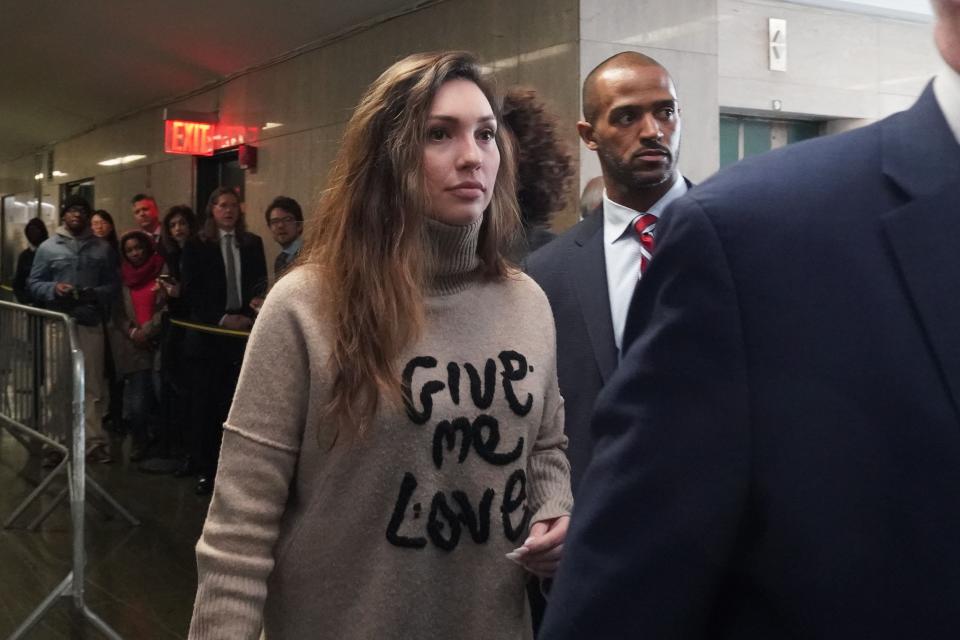
“He violated my trust, my body and my basic right to reject his sexual advances,” said Haleyi, who was the first of his victims to speak. "When he attacked me that evening, it scarred me emotionally and physically. It diminished my confidence and faith in people and my confidence and faith in myself.
"I’m relieved he will now know he’s not above the law.”
Haleyi began crying when she described herself as "not the perfect victim but as a human being," who is healing.
Mann went next, beginning her statement by attacking the defense. She said she had been grilled on the stand by lawyers who "twist the truth." She described the "horrors" of being raped by someone much bigger than she.
“My rape was preventable," Mann said. She was visibly emotional but did not cry. "This was a known offender whose previous crimes were covered up in a paper trail” of nondisclosure agreements. “I am forced to carry that experience until I die. It is a recurring nightmare that I feel is just as real as when it happened.”
She described Weinstein as "a senior citizen who is literally crumbling” before our eyes.
"Behind bars, Harvey can have the chance to rehabilitate while being held accountable for his crimes,” she said as she asked for the "maximum" sentence.
Weinstein was brought into court in a wheelchair, wearing a blue suit and white shirt.
Besides Weinstein's two victims, other accusers who testified against him at the trial also were in the courtroom, including Lauren Young, accompanied by her lawyer Gloria Allred, and Dawn Dunning, Tarale Wulff and Annabella Sciorra.
Wulff, like Dunning and Young a "prior bad acts" witness against Weinstein, posted an online letter Tuesday describing the impact on her life after she says Weinstein raped her in the summer of 2005.
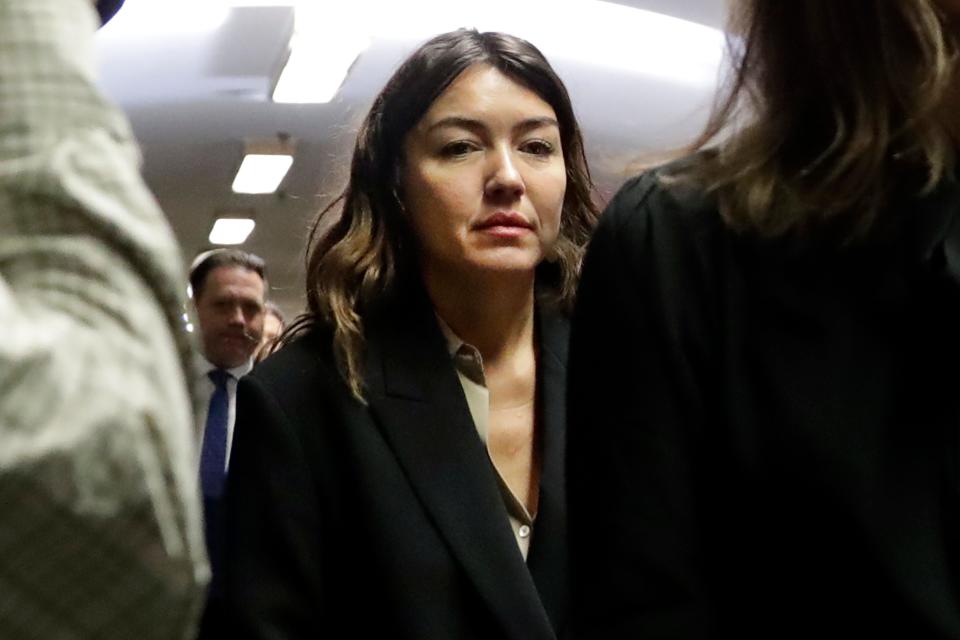
Under New York law, such witnesses are barred from delivering victim impact statements at sentencing.
After the sentence, Wulff spoke to reporters outside the courthouse. “This isn’t a happy circumstance to be in that we’re all here for, but I feel joy with what Judge Burke decided," she said."I hope the sentence sends a clear message that times have changed and that more women need to speak out for themselves, and men and women need to speak out for each other."
Also in attendance was actress Rosie Perez, a friend to accuser Sciorra of "Sopranos" fame who testified to corroborate Sciorra's testimony that Weinstein raped her in 1993 or 1994. Weinstein was acquitted of the two crimes involving Sciorra.
The first to address the court was Manhattan Assistant District Attorney Joan Illuzzi, who delivered the prosecution's sentencing statement. She described Weinstein as a man "drunk on power," a man distinguished by “a lack of human empathy, selfishness and a life rooted in criminality. Criminality that lasted for decades.”
Arthur Aidala, one of Weinstein's defense attorneys, followed the victims' statements, saying he did not intend to rush. "This is a man's life here," he said.
Aidala argued for the minimum sentence of five years, saying that eight and a half years is the average sentence in New York for these crimes.
"He has no criminal history, he’s almost 70, he’s a broken-down man,” Aidala said. He said a longer sentence would be “a death penalty.”
Defense attorney Donna Rotunno said Weinstein has “a multitude of medical issues” and a history of heart disease in his family; incarceration could make it difficult to get the care he needs, she said.
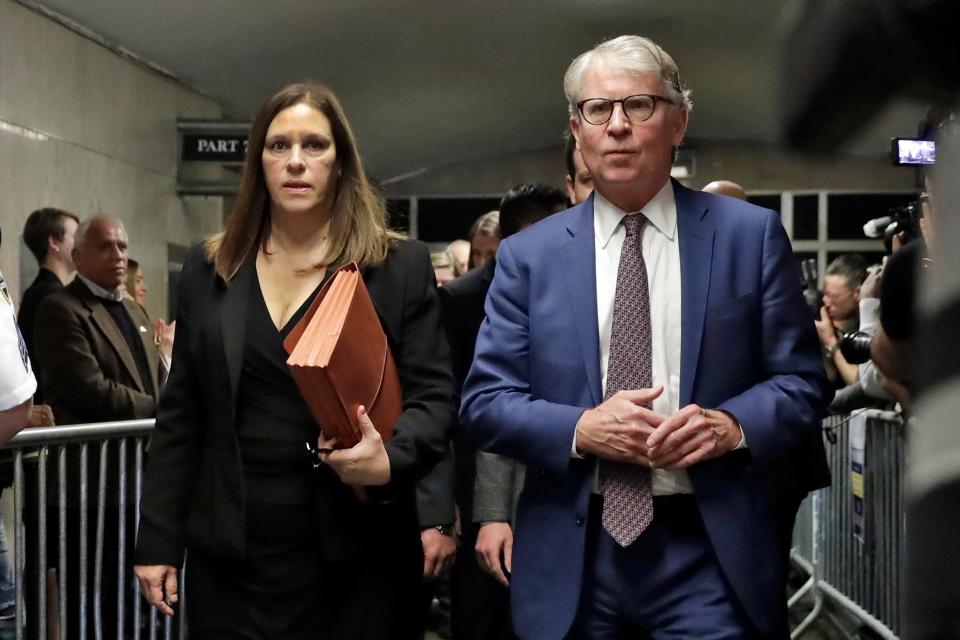
She said Weinstein's career as a movie producer and creative person should be considered, as well as the impact of a sentence on his family, including his grown and young children.
“No matter what happens here today, judge, no one really wins," Rotunno said. Even if he gets the minimum sentence, she said, "there's a good chance that Mr. Weinstein won't live to see the end of that sentence, which is very sad."
Under normal procedure, Weinstein will soon be taken into the custody of the state Department of Corrections and Community Supervision, which will decide the state prison where he will serve his sentence. The department will first collect medical information from the city's Rikers Island jail before Weinstein is transferred to a corrections reception center where he will be evaluated for medical, mental health and security needs, according to the department's process.
Initial reactions to the sentence from Weinstein's many accusers not involved in the trial were pleased but subdued.

“Harvey Weinstein's legacy will always be that he's a convicted rapist," said a group of accusers who call themselves the Silence Breakers, in a statement to USA TODAY. "He is going to jail – but no amount of jail time will repair the lives he ruined, the careers he destroyed, or the damage he has caused."
"This case – and the national reckoning about the pervasiveness of sexual violence it sparked – will have a lasting legacy," said Scott Berkowitz, president of the Rape, Abuse & Incest National Network (RAINN). "We hope that survivors will feel encouraged to come forward, knowing that it can truly make a difference in bringing perpetrators to justice.”
Rotunno, addressing reporters outside the courthouse, called the sentence "cowardly" and "total unfairness." She said Weinstein feels "terrible."
“He wasn’t treated fairly – not by the court, not by the jury, not by a lot of you" reporters, added defense lawyer Damon Cheronis.
Allred, who represents multiple accusers of Weinstein besides Haleyi, was jubilant, holding up a sign in front of reporters outside the courthouse. It read: "This is what justice looks like: 20 + 3 years.”
“This is my opinion, that this sentence is long enough for him to at least begin to understand what he’s done,” Allred told reporters. “Whether he will ever truly be sorry, I don’t know.”
The formerly powerful Hollywood producer, who turns 68 on March 19, suffered chest pains and high blood pressure immediately after the trial jury announced its verdict.
The verdict followed a 23-day trial in which six accusers testified against him, and the seven men and four women of the jury deliberated 26 hours over five days.
Harvey Weinstein guilty: Read what Jessica Mann, Miriam Haleyi say he did in their own words
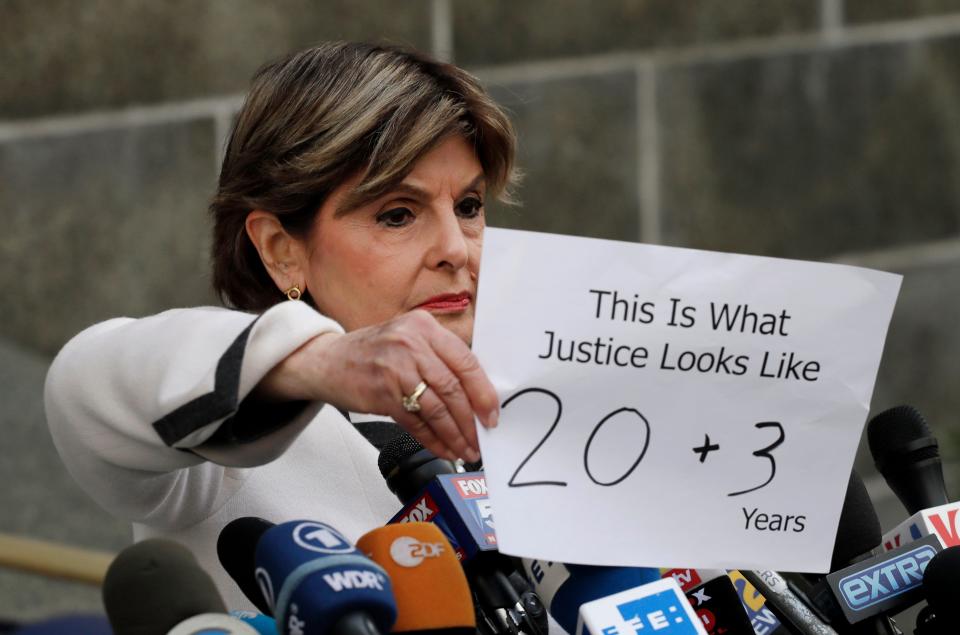
He was acquitted of three more serious charges, including predatory sexual assault and first-degree rape. If convicted on those charges, he could have gotten a life sentence.
Although Manhattan District Attorney Cyrus Vance Jr. did not win a total victory in the case, what he did win was enough for Weinstein's many accusers and #MeToo activists to claim a victory.
After the sentencing, Vance issued a statement, thanking the court for "imposing a sentence that puts sexual predators and abusive partners in all segments of society on notice."
"We thank the survivors for their remarkable statements today and indescribable courage over the last two years....Their words took down a predator and put him behind bars, and gave hope to survivors of sexual violence all across the world,” Vance's statement said.
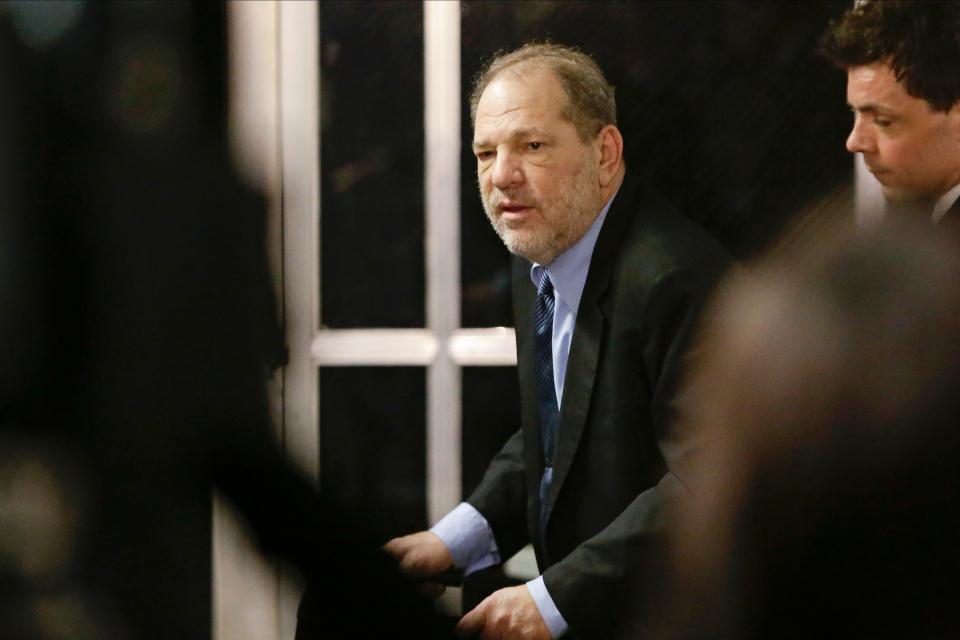
The #MeToo movement considered the trial a historic first effort to present and punish the reality of sexual violence in workplaces across the land, and in Hollywood especially.
As such, #MeToo activists hailed the verdict as a triumph. Now they savor the sense of retribution as Weinstein is locked behind bars.
Weinstein himself addressed #MeToo at his sentencing.
"I’m confused, and I think men are confused” about the #MeToo movement," Weinstein said in his rambling statement. "I think about the thousands of men and women who are losing due process, and I’m worried about this country.”
Defense lawyers have said Weinstein expects to appeal the verdict in July.
But his legal troubles are just beginning: Weinstein has been charged with four similar sex crimes in Los Angeles County. He has not been arraigned nor has a trial been scheduled.
But Los Angeles County District Attorney Jackie Lacey announced a few hours after the sentencing that her office had begun the process of extraditing Weinstein to California to face similar sexual assault charges filed in there in January.
Weinstein is also under investigation for sex crimes in London, although police there have said nothing about the status of their inquiries.
And apart from that, he faces multiple civil lawsuits by dozens of accusers.
This article originally appeared on USA TODAY: Harvey Weinstein hospitalized after sentenced to 23 years in prison